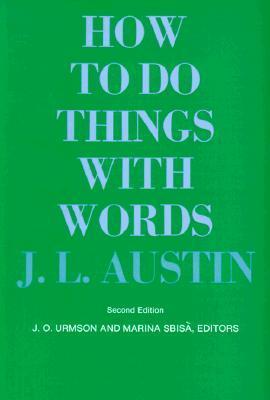What do you think?
Rate this book


168 pages, Paperback
First published January 1, 1955
Once upon a time, there was a philosopher called Frege, who had the interesting idea that language and logic were really, you know, pretty much the same thing. He invented predicate calculus, which was the best shot to date at making sense out of that particular approach. For example (this always comes up, for some reason), in English you might say "John loves Mary", and in predicate calculus you would write it asSo, in three academic generations, linguistic philosophers had found their way back to logic again, just a different kind of logic. I wonder why this doesn't leave me feeling happier?love'(john', mary')You have two constants, john' representing John, and mary' representing Mary, and the predicate love' obtains between them.
Some people, Bertrand Russell being a notable example, liked Frege's insight. They picked it up and improved it. And then, in 1921, a young Austrian called Ludwig Wittgenstein published the Tractatus Logico-Philosophicus, which was meant to finish the job. Language, explained Wittgenstein, consisted of "pictures", the predicate calculus expressions, which "connected to the world". I first came across the Tractatus when I was about 17, and I remember looking at it and trying to figure out how this connection was supposed to work. It didn't seem to be very clearly explained, and I wondered what I wasn't getting. But at the time, Wittgenstein thought he'd cracked the problems of philosophy. He retired, and did other things that were more fun.
After a while, Wittgenstein started to have misgivings. Maybe it wasn't all about logic: in fact, language often doesn't seem to be logical at all. (I know. You could have told him that, right? But Great Philosophers prefer to work it out by themselves). He started compiling a huge quantity of notes, which were meant to outline a new theory. These eventually saw the light as the Philosophical Investigations, an impressive mess. Wittgenstein apologised "for not writing a better book", but he managed to convince many of his colleagues that logic may not in fact be the right way to think about what language means.
And so we get up to Austin, one of Wittgenstein's brightest students, who wrote How To Do Things With Words. He probably wasn't as inspired as his master, but he was certainly much better organised. One key insight immediately found favour. There are some ways of using words that do indeed seem to be about describing the world; but there are others that are about interacting with it. As Austin pointed out, when the Mayor says "I now pronounce you man and wife", she isn't describing anything. She makes something happen by virtue of what she says. And, when you think a little more, you see that this is the top of a linguistic iceberg. "Performatives", as Austin called them, are very common. It's not just marrying people: it's a bunch of other things, like making promises, or issuing threats, or asking questions. Austin suggested some more useful terms, which were also enthusiastically adopted, and now everyone in linguistics talks about locutionary acts, perlocutionary acts and illocutionary force. The standard example is someone asking "Is there any salt?" The locutionary act is a question about the presence of salt, but the perlocutionary act is causing somebody to hand you the salt. The illocutionary force is a command to give you salt.
Austin had a bright student of his own, called Searle, and Searle took the ideas further. He wrote a book called Speech Acts, where he described different kinds of illocutionary acts. And then Searle had a student called Vanderveken, and together they developed a framework for writing down speech acts as formulas, in a new framework they called illocutionary logic.